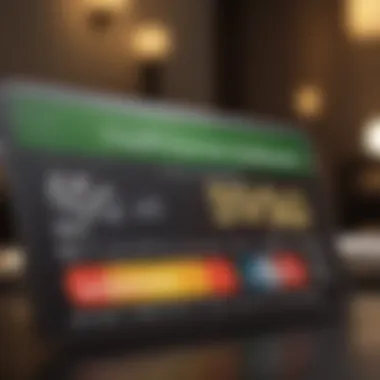Strategic Weekly Credit Card Payment Methods


Intro
Managing credit card payments can often feel like navigating a minefield, especially if you're striving for better financial health. The concept of making weekly credit card payments isn't just a fad—it's an increasingly recognized strategy that has the potential to reshape one's financial landscape. Unlike the typical monthly payments that many individuals follow, the weekly approach encourages a more active engagement with your finances.
With this article, you'll gain valuable insights into the ins and outs of making weekly credit card payments. We’ll discuss how this practice can lower your credit utilization ratios, thereby enhancing your credit score and fostering better overall credit management. Alongside this, the article will delve into the psychology behind regular payments, showcasing how they can alleviate the burden of debt and contribute to improved financial wellbeing. By examining different payment methods, the importance of budgeting, and long-term planning, you’ll be well-equipped to take control of your credit card debt and improve your fiscal stability.
Credit Management
Credit management is a cornerstone of an individual's financial strategy. It encompasses how you handle credit accounts, including credit cards, loans, and mortgages. Wise management not only influences your credit score but also affects your ability to secure loans for bigger purchases down the line.
Importance of Credit Scores
Your credit score is more than just a number—it's a reflection of your creditworthiness. Lenders and financial institutions use this score to gauge the level of risk involved in lending you money. A higher score typically means better loan terms, lower interest rates, and more favorable repayment conditions.
Ways to Improve Credit Score
Improving your credit score can seem daunting, but small, consistent efforts can yield significant results:
- Pay bills on time: Consistency in payments reflects reliability in managing credit.
- Keep credit utilization low: Aim to use less than 30% of your total credit limit.
- Limit new credit inquiries: Each application can temporarily ding your score, so be selective when applying for credit.
How to Monitor Credit Report
Monitoring your credit report can provide insights into your financial standing and alert you to any discrepancies. You can obtain a free credit report annually from top agencies like Experian, TransUnion, and Equifax.
"Regularly reviewing your credit report can help catch errors and fraudulent activities early on."
By being proactive with your credit management, you set the stage for better financial opportunities ahead.
Weekly Payment Strategies
In this section, we will look closely at how adopting a weekly payment strategy can drastically improve your credit profile and reduce stress surrounding debt. Weekly payments can not only help in managing current financial obligations but also pave the way for smoother financial sailing in the future.
Understanding Credit Card Payments
Grasping the nuances of credit card payments is crucial in navigating the often treacherous waters of personal finance. With the repercussions of poor payment habits rippling through one’s financial health, understanding the mechanisms behind credit card billing can drive smarter decisions. It's more than just reading the monthly statement; it's about drilling down into how those charges accumulate, how interest is calculated, and how your payment behavior affects your overall financial status.
The first step in mastering credit card payments is recognizing how credit card billing works. When you use your card, every transaction is logged and grouped into a billing cycle, which often spans about 30 days, culminating in a statement detailing your balance owed, minimum payment required, and payment due date. This cycle is the basis on which all subsequent accounting is built. If you're not onto the ins and outs of this process, you could be giving away hard-earned money to interest or damaging your credit score.
How Credit Card Billing Works
Understanding how billing works is akin to knowing the rules of a game before you play. Each month, your credit card issuer provides a statement that includes several important factors:
- Billing Cycle Duration: Typically 28 to 31 days, it’s the period during which transactions are recorded.
- Grace Period: This is often around 21 days where you can pay off your total balance without facing interest.
- Minimum Payment: This is the least amount you can pay to stay current, but it’s often hardly enough to maintain a healthy balance.
- Total Balance: This is what you owe as of the statement date, including any accumulated interest for unpaid balances from previous months.
A deeper grasp of these elements can lead to improved cash flow management and informed payment strategies. Missing payment deadlines not only incurs late fees but can also lead to a substantial dip in your credit score.
Types of Payments: Minimum vs. Full vs. Weekly
Navigating payment types is crucial when drawn against the larger canvas of credit management. Credit card payment strategies generally break down into a few distinct categories, each with its own implications.
- Minimum Payments: While this may seem like a lifeline during tight times, relying on minimum payments can be a costly choice in the long run. When you only pay the minimum, interest accrues on the remaining balance, creating a cycle of debt. This leads many into a sort of financial quicksand where they find themselves perpetually strapped for cash.
- Full Payments: Paying off the full balance each month can be the best route. Not only do you avoid interest, but you also bolster your credit score by keeping your credit utilization ratio low. This method requires discipline and careful budgeting but reaps dividends in terms of financial health.
- Weekly Payments: This is where we introduce the concept of strategic weekly payments. By making smaller, more frequent payments, you can achieve multiple benefits. Essentially, this method can help in reducing the interest you accrue over time and also allows you to adjust your cash flow in a more manageable manner. Making weekly payments also psychologically reinforces good credit habits and encourages a proactive approach to managing expenses.
"If you can breathe easy by making those weekly payments, why wouldn’t you? Every little helps in building a better financial future."
By understanding the different types of payments and their respective impacts, individuals can tailor their payment strategies to align closer with their financial goals. Making credit card payments isn’t just a matter of ticking a box each month. It’s an approach that needs thoughtful consideration and a clear understanding of how your choices shape your monetary landscape.
The Benefits of Paying Off Credit Cards Weekly
Paying off credit card balances on a weekly basis offers distinct advantages that can significantly enhance financial wellbeing. Shifting from monthly to weekly payments is not just a minor tweak in routine; it can reshape how you manage debt, influence your credit score, and nurture positive financial habits. With the increasing complexity of personal finance, understanding the benefits of regular payments becomes essential for anyone aiming to forge a path toward improved financial health.
Improving Credit Utilization Ratio
One of the primary benefits of weekly payments is the positive impact on the credit utilization ratio. Simply put, this ratio measures the amount of credit you are using relative to your total available credit. For instance, if you have a credit limit of $10,000 and a balance of $3,000, your utilization ratio is 30%. Lenders view ratios above 30% as risky, which can lead to higher interest rates or potential impacts on credit approval.


By making weekly payments, you can keep your balance lower throughout the month. This results in a more favorable utilization ratio when the billing cycle closes. For example, if you pay off $500 each week on a $2,000 balance, your credit utilization could drop to just 10% by the time the statement is issued. This regular reduction signals to lenders that you are a responsible borrower, which can not only improve your credit score
Reducing Interest Accumulation
Interest can be a costly sidekick when it comes to credit cards. Most credit cards charge interest on the remaining balance every month, often propelled by the annual percentage rate (APR). When you make payments weekly, you effectively lower your principal balance earlier, minimizing the interest that accrues over time.
Using the same $2,000 balance example, if you reduced your balance by $500 per week instead of waiting for a month, you'd trim down a significant amount of interest cost. Consider this: if your card has a 20% APR, the interest calculated on $2,000 for 30 days will differ vastly from the interest calculated after reducing that balance with weekly payments. In short, regular payments provide a far more economical way to handle debts.
Psychological Benefits of Regular Payments
Beyond financial maneuvers, the psychological impact of making regular payments can’t be ignored. It's similar to the sentiment of “small wins” in various life scenarios. By paying off credit cards weekly, individuals experience a sense of control over their finances. This ritual not only reduces anxiety about unpaid debts but also fosters discipline.
People often think of debt as a looming shadow. When payments are made regularly, that shadow diminishes, allowing individuals to focus on other aspects of their lives. The structure of a weekly payment system can become a reliable element in your financial framework.
"Managing debt doesn’t have to feel overwhelming. Small, consistent efforts can lead to significant outcomes."
Moreover, this habit builds a positive feedback loop. The more you pay, the more confident you become in your ability to manage your finances, creating a virtuous cycle of accountability and empowerment.
This goes beyond mere numbers; it affects your overall approach to financial management. Regular payments can translate into more informed spending habits, leading you to make wiser choices in areas like savings or additional investments.
Understanding these benefits offers a clearer picture of why weekly credit card payments can become a powerful tool for financial mastery. With improved credit utilization, reduced interest costs, and psychological confidence, incorporating a weekly payment routine can yield far-reaching benefits for your financial landscape.
Setting Up a Weekly Payment System
Establishing a weekly payment system for credit cards can serve as a fundamental pillar of effective personal finance management. It isn’t just about staying current on payments; it's a strategic maneuver designed to cultivate better spending habits, minimize interest payments, and boost overall financial stability. By systematically addressing credit card balances week by week, individuals can forge a path towards improved credit health and peace of mind.
Automating Weekly Payments
One of the best ways to ensure that you don't miss a beat with your credit card payments is automation. Setting up automatic payments means that you won't have to worry about whether you remembered to pay your bill or not. Instead, the brainwork shifts from the day-to-day grind to a clear, set-it-and-forget-it mentality.
Automation works best when you establish your payments based on your cash flow cycle. If you know you get paid weekly, align your payment days with that rhythm. This method can help manage your cash flow and ensure you're not left short when a larger bill cycles in. Plus, some credit card companies might even reduce interest rates or offer perks for enrolling in automatic payments.
Here’s how to get started:
- Log in to your credit card account.
- Navigate to the payments section.
- Look for the option to set up automatic payments.
- Choose whether to pay the minimum, a fixed amount, or the full balance.
- Confirm your payment dates.
Once you’ve set it up, keep an eye on your account for the first few months to ensure everything is running smoothly. Adjustments may be necessary, particularly with months that have five weeks instead of just four.
Using Budgeting Apps for Monitoring Payments
Budgeting apps have revolutionized how we handle our finances. Instead of scribbling in notebooks or keeping complicated spreadsheets, these intuitive digital tools present a more organized way to track spending and, crucially, monitor credit card payments.
Many budgeting apps connect directly to your bank and credit card accounts. This connection allows for real-time updates on your spending habits and outstanding balances. Seeing where your money goes daily can make one think twice before purchasing that extra video game or luxury item.
Key benefits of utilizing budgeting apps include:
- Alerts: Get notifications ahead of your payment due date, which can prevent late fees.
- Summary: A clear view of your financial stance can highlight patterns, helping to adjust habits.
- Goal Setting: Some apps allow you to set and track multiple financial goals, such as paying off credit cards faster.
So, download a few and test out which interface you find the smoothest. After some time, you’ll likely find a system that clicks for you.
Creating a Personalized Payment Schedule
Making a personalized payment schedule sets the stage for focusing on financial goals. What works for one person may not be suitable for another. Building a schedule tailored to your circumstances incorporates your income pattern, spending habits, and due dates into the mix, providing a strategic advantage over a one-size-fits-all solution.
When drawing up your schedule, consider what your payment frequency should be. You might choose to set payments on the same day you receive income, or perhaps scheduling them at the end of the week gives you a clearer picture of your discretionary spending.
Important factors to consider when creating your schedule include:
- Credit card due dates
- Fluctuating income (if applicable)
- Monthly expenses that might compete for cash flow
Once you’ve plotted out the framework, stick to it as best as you can. Consistency tends to bear fruit in the long run. Over time, you’ll begin to see changes in your credit utilization ratio and your financial mindset.
"A good financial plan is a roadmap that shows you exactly where you’re going and how to get there."


By taking these steps, anyone can move towards a more controlled and less stressful relationship with their credit, resulting in a more secure financial future.
Analyzing Financial Implications
Understanding the financial implications of adopting a weekly credit card payment strategy is crucial for anyone serious about improving their financial health. Analyzing how weekly payments can impact your credit score and long-term financial wellness offers valuable insights. This knowledge equips savvy users with tools to maximize the benefits while mitigating any potential downsides that may arise from improper management.
Impact on Credit Scores
One of the most immediate effects that a shift to weekly payments can have relates to your credit score. Your credit score is influenced by several factors, but two of the most significant are your payment history and credit utilization ratio.
- Payment History: By making payments weekly instead of monthly, you not only lower your chances of missing a due date but also demonstrate to creditors that you prioritize your debts. This proactive stance can boost your credit score over time, as it reflects a history of responsible credit use.
- Credit Utilization Ratio: Keeping your balance low is a key to maintaining a good credit score. Paying weekly can help you manage your credit utilization more effectively. Instead of waiting until the end of the month to pay off a larger balance, making smaller payments throughout the month keeps it in check. Ideally, your utilization ratio should be below 30%—the lower, the better. Conversely, if you continue to rack up charges without any payments, you might find yourself in a precarious situation.
"Payment behaviors today can set the trajectory for your financial future. Make adjustments as soon as possible to avoid unwanted surprises later on."
Long-term Financial Health Benefits
Looking beyond just the immediate effects on your credit score, the long-term implications of a weekly payment system can provide significant advantages as well. Over time, these strategies play a pivotal role in shaping your overall financial landscape.
- Building a Budgeting Habit: Regularly scheduling these payments can instill a habit of mindfulness regarding your finances. You naturally become more aware of your spending habits, leading to more conscious decisions about your purchases.
- Interest Savings: By reducing your outstanding balance, you tend to pay less in interest over time. Credit card companies typically calculate interest on the average daily balance; therefore, keeping that balance lower consistently can lead to notable savings.
- Enhanced Financial Agility: As you create a rhythm with your finances, it allows you to pivot more easily in case of unexpected expenses or economic downturns. This agility can prove invaluable during uncertain times when you need to rely on your financial tactical skills.
In summary, understanding the financial implications of weekly credit card payments is not merely about crunching numbers; it's about laying the groundwork for healthier financial habits and a more secure future.
Challenges of Weekly Payments
In the quest for financial mastery, weekly credit card payments can offer a host of advantages. However, like any strategy, it comes with its own set of challenges. Understanding these obstacles is crucial in navigating your way to sound financial health, as it determines how effectively one can implement this strategy without falling into pitfalls.
Managing Cash Flow Effectively
One of the most significant challenges of weekly payments is managing your cash flow effectively. Weekly payments might seem like a piece of cake, but they can put a strain on your finances if not handled carefully. The heart of this issue lies in the timing. For those who are used to a monthly budgeting cycle, shifting to a weekly payment system requires some adjustment.
It's crucial to ensure that you have the necessary funds available for weekly payments. Here are some tips on managing cash flow:
- Track your income: Keep a close eye on when you receive your pay. This will be vital for knowing when to allocate funds for credit card payments.
- Set aside funds: Treat your credit card payments like a bill. As soon as you get paid, set aside a portion of funds specifically for these payments.
- Review your spending: Assess your weekly expenses. Trim down unnecessary spending to prevent overspending and ensure you can make those payments without breaking the bank.
By being mindful of your cash flow and planning accordingly, you can turn weekly payments into a smooth and manageable process rather than a financial tightrope walk.
Potential Fees and Costs
While weekly payments can lower interest charges and improve credit scores, they might also lead to unexpected fees. Yes, that’s right. If a consumer isn’t careful, trying to manage payments more frequently may backfire, costing you more than anticipated. Knowing these potential fees is important not only as a part of your budget but as the very heart of your payment strategy.
Here’s what to watch for:
- Payment Processing Fees: Some credit cards may impose fees for each transaction. If frequent payments incur these charges, they can accumulate and eat away at your savings.
- Overdraft Fees: If your bank account dips below zero in a bid to keep up with these payments, be ready for hefty overdraft fees. Staying vigilant about account balances mitigates this risk.
- Late Payment Fees: Maintaining a weekly regimen requires strict discipline. An oversight can lead to missed payments. And those late fees add up faster than a speeding ticket.
"Planning is bringing the future into the present so that you can do something about it now." — Alan Lakein
Paying attention to these details prepares you for the journey ahead, ensuring that weekly credit card payments remain a strategic advantage in optimizing financial health.
Integrating Weekly Payments with Overall Budgeting
Incorporating weekly credit card payments into one's overall budgeting strategy is akin to placing the final puzzle piece into a complex image; it completes the picture, making everything fit together more harmoniously. Without this integration, one risks creating a financial plan that is either too rigid or too flexible, which can lead to missed payments, unexpected fees, and mounting debt.
The beauty of syncing weekly payments with a broader financial framework lies in the enhanced control it offers. Regular payments not only help keep the credit utilization ratio low, but they also provide clarity on cash flow and spending habits, ultimately supporting sound financial management.
Creating a Cohesive Financial Plan
Establishing a cohesive financial plan is not a walk in the park; it requires meticulous thought and, more importantly, regular adjustments. To weave weekly payments seamlessly into a financial tapestry, it’s essential to begin by understanding your income and expenses in detail. Here are a few techniques that can aid in creating a solid planning foundation:
- Identify All Sources of Income: List all income streams, such as salaries, freelance work, or passive income, to get a clear picture of available resources.
- Track Fixed and Variable Expenses: Categorize monthly expenses into fixed (rent, utilities) and variable (groceries, entertainment) to identify potential areas for savings.
- Set Payment Priorities: Once income and expenses are laid out, determine which debts affect your financial health the most and set strategic goals around paying them off.
- Utilize Budgeting Tools: Employ budgeting apps or spreadsheets to maintain an overview of financial activities throughout the month.
This structured approach not only provides the insight needed to anticipate cash flow needs for weekly payments but also encourages mindful spending habits. Having a clearly defined budget helps to demystify the often tedious task of managing credit payments, allowing for less emotional strain when the time comes to commit funds.
Adjusting Other Expenses Accordingly


With weekly payments firmly woven into your spending plan, the next step is adapting other expenses to ensure you’re not living paycheck to paycheck. Since life has a way of throwing curveballs, having a flexible budget is crucial. Here are a few strategies to make that adjustment:
- Cut Back on Discretionary Spending: Identify non-essential expenses such as dining out or subscription services and determine where cuts can be made without sacrificing too much enjoyment.
- Plan for Variable Expenses: Anticipate costs that fluctuate, such as groceries or entertainment, and try to bracket that spending within a defined limit.
- Save Extra Windfalls: Whenever you receive unexpected income, whether a work bonus or a gift, consider allocating a part of that toward your credit card payments.
- Regularly Review Your Budget: At the end of each month, take a step back and see how your spending aligns with your goals. This will help to maintain focus and adjust for the next month.
"A penny saved is a penny earned."
Ultimately, the goal of integrating weekly payments into your budgeting strategy is not merely about making payments on time but ensuring these payments align with a broader picture of your financial health. By creating a cohesive financial plan and adjusting other expenses accordingly, the path to understanding your financial habits becomes clearer. Each step contributes to greater stability and a more profound sense of control over one’s financial journey.
Exploring Alternative Strategies
When it comes to managing credit card payments with a strategy that promotes financial stability, one must not overlook the importance of alternative strategies. These can help avoid the pitfalls often associated with credit card debt while enhancing the overall financial health of an individual. Exploring these options not only provides a safety net but also arms consumers with various tools tailored to their unique circumstances.
The strategies discussed herein serve two primary purposes: optimizing the use of available credit resources and implementing practical methods to control spending and debt accumulation. As the saying goes, "Don’t put all your eggs in one basket." This principle rings true in the context of using credit cards responsibly. Here are two specific approaches that can be beneficial.
Smart Use of Rewards and Cash Back
Using reward systems attached to credit cards is not just a promotional gimmick; it can be a strategic move that helps manage expenses effectively. Many credit cards offer cash back on purchases, allowing cardholders to benefit from their spending habits while also consciously handling their finances. For example, if a cardholder knows they spend heavily on groceries, choosing a card offering a percentage back on grocery purchases can lead to savings that accumulate over time.
To maximize the benefits from these rewards, consider the following:
- Understanding the Terms: Each card has its own rules regarding rewards. Some may have rotating categories or spending limits, so it’s essential to know the ins and outs.
- Focusing on Everyday Purchases: Instead of making luxury purchases just to earn rewards, focus on using your card for items you would typically buy. This ensures that you’re not overspending.
- Regularly Reviewing Rewards: Financial institutions frequently update their reward programs. Keep an eye out for better offers and adjust your card usage accordingly.
"The key to truly benefiting from rewards is not getting seduced by the shiny rewards, but making sure they align with your usual spending habits."
Balance Transfers and Other Methods
For many, managing credit card payments may involve navigating existing debt. This is where balance transfers come into play. A balance transfer means moving your outstanding debt from one card to another, often to take advantage of lower interest rates. It’s like jumping ship to a bigger one but with more lifeboats. Here’s how to make the most of this strategy:
- Assessing Fees: Sometimes, transferring a balance incurs a fee. Before making this leap, calculate whether the interest savings outweigh the transfer fees.
- Paying Off Transferred Balances Quickly: If a promotional low interest offer is present, it’s wise to have a plan to pay off the transferred balance within that term to maximize savings.
- Keeping Old Accounts Open: When a balance is transferred, it can be tempting to close the original account. However, keeping it active can preserve your credit utilization ratio, positively impacting your credit score.
Case Studies: Effective Implementation
Understanding how others navigate the often-treacherous waters of credit card debt can be invaluable. Case studies highlight the real-world impact of paying off credit cards weekly and the strategies that lead to success.
Diving into these specific examples helps demystify the process of converting theory into action. In particular, case studies serve as a guide, showcasing what works and what pitfalls to avoid. They also reveal the varied approaches individuals and families take based on their unique financial situations, offering keys to broader applicability.
Real-world Examples of Successful Weekly Payments
A wealth management firm recently published insights from a couple who began implementing weekly credit card payments. Initially burdened with over $10,000 in credit card debt, they set aside a portion of their weekly paycheck specifically for credit card payments. By adjusting their payment schedules, they not only managed to chip away at their debt faster but also watched their credit score improve, which opened up better interest rates for future loans.
An intriguing case comes from a young professional who utilized budgeting apps to track expenses. By shifting focus to weekly payments, they noted a drastic reduction in accrued interest. Their method included allocating $200 each week to pay off credit card balances, effectively taking a substantial bite out of the principal. This approach not only made payments manageable but also provided a clear sense of progress as each week rolled over.
Moreover, a mother of two started a similar weekly approach along with her family's budgeting process. After seeing her family’s financial landscape change for the better, she often shares her journey on forums, detailing how eliminating the burden of late fee buildups positively affected their family dynamic and peace of mind.
Lessons Learned from Different Financial Situations
From these case studies, several lessons emerge:
- Setting Clear Goals: Each person interviewed had well-defined goals regarding their credit card usage, whether it was to pay off a specific balance or to improve their credit score for a future mortgage.
- Flexibility is Key: Adapting the payment plan based on monthly income fluctuations was also mentioned regularly. Some months required more aggressive payments than others, showcasing the need for a personalized approach.
- Consistent Monitoring: Utilizing financial tools and apps not only kept individuals accountable but provided insights into spending habits that often led to better budgeting overall.
- Emotional Benefits: Most case studies outlined a significant psychological relief after establishing a regular payment schedule. The notion of breaking free from monthly anxiety tied to credit card debt was a common theme.
Real-life examples illustrate that adopting a weekly payment strategy is not just about numbers; it generates a profound shift in perspective and financial behavior. The stories behind these successes serve as motivation and guide, helping others visualize their own potential paths to financial wellness.
The End: The Path to Financial Mastery
In this fast-paced world, mastering finances, especially through strategic approaches, can seem like a daunting task. However, understanding the nuances of weekly credit card payments is a critical step towards taking control of one’s financial landscape. Not only does it aid in lowering the credit utilization ratio but also positions individuals on a solid path to financial health. Implementing a consistent payment schedule can transform a person’s relationship with credit, fostering habits that lead to sustainability and less debt stress.
Adopting weekly credit card payments brings about numerous benefits worth considering. The most notable being the reduction in interest accrual, which can cause the balance to balloon if left unchecked. Each payment chips away at the principal, which, in turn, affects overall interest calculations positively. Furthermore, the routine establishes a rhythm in financial management, ensuring money is handled with ease and foresight.
Most importantly, this strategy instills a level of discipline that transcends mere credit card payments. Once individuals get into the habit of monitoring their expenses regularly, they become more aware of their overall financial situation. The control one gains allows for better budgeting practices and opens the door to improved financial literacy.
Summarizing Key Points
- Reduction of Debt: Paying weekly directly impacts how quickly debt can be cleared. Smaller, more frequent payments can encourage a proactive stance on financial obligations.
- Improved Credit Score: By keeping credit utilization ratios low in real-time, individuals are likely to see a boost in their credit scores.
- Financial Awareness: Regular payments bring spending habits into sharper focus, enabling individuals to recognize areas of waste or excess.
- Less Stress: By managing payments weekly, the overwhelming burden of monthly bill payments can be diminished.
"Educating yourself on the dynamics of credit cards is not just about managing debt; it’s about setting the stage for future financial freedom."
Encouraging Proactive Financial Management
The essence of proactive financial management lies in anticipation rather than reaction. By establishing a routine with weekly credit card payments, individuals can embrace a mindset geared toward long-term financial health. It’s all about driving habits that promote accountability.
- Budgeting Mindset: Regular payments encourage a shift from impulsive spending to thoughtful budgeting. Utilizing tools like apps facilitates tracking incomes and outflows, thereby fostering a comprehensive understanding of finances.
- Setting Goals: With the knowledge of payment cycles and interest rates, setting realistic financial goals becomes achievable. This could be saving for a vacation or building an emergency fund.
- Creating Safety Nets: Individuals become more disciplined in saving, as they designate funds previously allocated for high interest payments into savings or investment accounts.
- Continuous Learning: The journey doesn’t end with just managing credit card payments; it opens avenues for exploring additional financial literacy topics, such as investment strategies or debt consolidation options.







